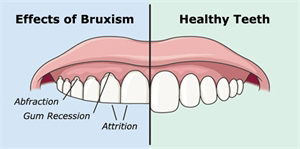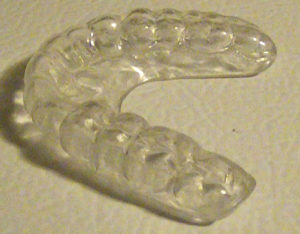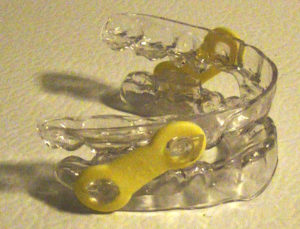Affordable Night Guards
Do you grind your teeth? Wake up a lot randomly during the night? Have jaw pain, pain when chewing, or random toothaches in the morning? All these things can be signs of clenching, grinding your teeth, and other sleep related issues. The good news is if you live in Longmont (or like driving to Longmont!), we can do something about it! We offer affordable night guards, sleep appliances, and other TMJ treatments conveniently in Downtown Longmont. Contact us today!
TMJ is the abbreviation for the Temporomandibular Joint. This is the joint that links your jaw to your skull, and can both slide and rotate. The strong muscles here are used for chewing, allowing the jaw to move open and closed, forward and back, and side to side.
TMD or Temporomandibular disorder is the general category for a wide range of TMJ issues, ranging from mild popping and clicking to chronic pain. TMD can manifest in many, many different forms including pain on chewing, tooth pain or sensitivity, headaches, jaw pain, sinusitis, ear pain, and neck pain. In extreme cases this can also be lockjaw, the inability to open your jaw past a certain point.
TMJ problems are most often caused by excessive grinding or clenching of the teeth (Bruxing and Bruxism). This grinding occurs most often during sleep, and can also be aggravated by stressful situations or chewing hard foods. It can also be naturally aggravated by a mis-match between where your jaw would like to rest (where the jaw muscles are most relaxed) and where your teeth fit together.
There are 4 common ways to resolve TMJ Issues. At Honest Dental, we will help you get to the root cause and resolve it in the most effective, most affordable way possible. Contact us today link to contact page and we’ll be happy to find the best solution for you.
- Habit breaking – Sometime resolving TMJ disorders is as simple as sticking your tongue between your teeth during the day so that you don’t clench, or putting down the pack of gum from time to time. Best thing about this solution? It’s free!
- Pain control – Ice and hot packs are great at helping muscles relax. Non-tylenol over the counter pain relievers have anti-inflammatory properties. These two combined can help an aggravated TMJ, giving it a chance to relax and rest. In a lot of situations giving the muscles a break can take care of a lot of the symptoms.
- Night Guard – If you aren’t clenching or grinding during the day, usually TMJ related issues are being caused by grinding at night. A Night Guard prevents grinding and can relieve these issues
- Sleep appliances – In certain instances, Grinding at night can be a symptom of sleep related issues of airway obstruction (sleep apnea). These issues are often associated with snoring as well). A sleep appliance can both resolve the grinding and the snoring issues and help you sleep deeper through the night, often without the need for a CPAP (or a much lower setting on a CPAP). It is generally much less expensive than a CPAP, and is generally much more comfortable as well.
A complicated word for teeth grinding, Bruxing and bruxism are a normal part of growing up. While teeth are developing and growing in, the grinding can help your mouth find its natural bite.
Later in life or if the grinding/clenching get too severe, it can cause a multitude of problems.
- It can cause TMJ disorders, as discussed above.
- Your teeth normally wear off about 0.03mm per year (1/5th of a hair width), but when you grind you can wear off as much as 10 times that! This can result in exposing the soft inner parts of the tooth to the mouth, resulting in hot/cold sensitivity and an increased risk of cavities/other issues.
- All that grinding and clenching puts a lot of strain on whichever teeth hit first, which can chip or crack these teeth, needing fillings where they cracked and resulting in many other dental issues (cracks and micro-cracks can extend to the roots, needing root canals, crowns, extractions, etc.).
- The rocking effect that can occur by grinding back and forth on a tooth can cause pressure resulting in gum recession and loose teeth.
 Solutions are highly dependent on the underlying cause. Bruxing can be caused by sleep issues, stress, poorly fitting teeth, chewing hard foods (aggravating your TMJ), and many others. Stress reduction, Night Guards, adjustment of your bite, orthodontics, and sleep appliances can all be involved in the solution to treat Bruxism.
Solutions are highly dependent on the underlying cause. Bruxing can be caused by sleep issues, stress, poorly fitting teeth, chewing hard foods (aggravating your TMJ), and many others. Stress reduction, Night Guards, adjustment of your bite, orthodontics, and sleep appliances can all be involved in the solution to treat Bruxism.
 A Night Guard works in two ways. One, by providing a flat, hard (but softer than your teeth) surface for your teeth to bite against, it protects your teeth from the chipping and wear normally associated with bruxing (grinding). By being a hard, and not gummy material, the Night Guard is not satisfying to “chew/grind” at night resulting in less grinding. Two, when your teeth try to do grinding motions (side to side or forward), with a Night Guard your front teeth and canines hit first. Because your brain only likes to grind on your back teeth (the front teeth are used for biting), whenever your front teeth touch a signal is sent to your brain that stops you from grinding.
A Night Guard works in two ways. One, by providing a flat, hard (but softer than your teeth) surface for your teeth to bite against, it protects your teeth from the chipping and wear normally associated with bruxing (grinding). By being a hard, and not gummy material, the Night Guard is not satisfying to “chew/grind” at night resulting in less grinding. Two, when your teeth try to do grinding motions (side to side or forward), with a Night Guard your front teeth and canines hit first. Because your brain only likes to grind on your back teeth (the front teeth are used for biting), whenever your front teeth touch a signal is sent to your brain that stops you from grinding.
Over-the counter night guards can be a cheap solution for some teeth grinding situations. If you are going to try one, “The Doctor’s Night Guard” is available at most major retailers and on Amazon for about $15-$20. It has a soft interior and a slightly harder exterior surface for your teeth to grind on like a real Night Guard. It also fits most mouths somewhat well.
With that said, it is not customized to your mouth and is still fairly gummy, so the fit isn’t great and your jaw loves to chew on the soft gumminess of it which in some cases can actually make the grinding worse. For some cases of mild grinding it works great, and at this price point is often worth a shot. We are in no way affiliated with any over the counter Night Guard.
Night Guards are custom made not just to how you bite together, but also to every direction you grind. A Night Guard starts by making a hard-soft laminated mold of one arch. This is soft on the teeth it sits on for comfort, but has a hard outer shell for the opposing teeth to hit against. This is then added to multiple times using a hard acrylic material over the top which gives it the flat, smooth, skating-rink type surface for your teeth to grind against. The anterior (front teeth) ramp is put in so that during grinding the anterior teeth contact first in specific ways. This is then ground down to optimize the contact points of all your teeth in all possible bite positions (and while grinding), so that the Night Guard works as well as it possibly can. After this is done the Night guard is delivered to you, and final adjustments are made using your actual bite with paper that marks where it hits your teeth. Sometimes after your jaw has had some time to “deprogram”, additional adjustments are made to optimize performance further. Adjustments are always done in our office free of charge.
Our Night Guards are entirely made in our office. Many dentists send these out to dental labs to make them quickly and then the dentist makes final adjustments in the chair. We have found that by doing the entire Night Guard ourselves, the final result turns out better and is better customized to each patient’s mouth and unique grinding problems. This results in a more effective Night Guard for each patient that is also smaller and more comfortable. This also keeps our Night Guards affordable.
Don’t forget to bring in your Night Guard or sleep appliance to every cleaning! We will check the bite and fit, make any needed adjustments, clean it in our ultrasonic cleaner, and remove the hard calculus buildup for free every time! Whether we made it or not!
 Sleep appliances, much like night guard are custom appliances designed to keep your mouth in a specific orientation. The difference is that a sleep appliance is designed to help with airway obstruction (sleep apnea) in addition to grinding. By holding the lower jaw forward, a sleep appliance holds the airway open and keeps the tongue out of the way, allowing for better breathing and reducing apnea. In some cases an appliance can be sufficient, allowing a patient to lower the setting on a CPAP or to stop using a CPAP entirely. Note that you should only stop using a CPAP after consulting with the doctor who originally prescribed it.
Sleep appliances, much like night guard are custom appliances designed to keep your mouth in a specific orientation. The difference is that a sleep appliance is designed to help with airway obstruction (sleep apnea) in addition to grinding. By holding the lower jaw forward, a sleep appliance holds the airway open and keeps the tongue out of the way, allowing for better breathing and reducing apnea. In some cases an appliance can be sufficient, allowing a patient to lower the setting on a CPAP or to stop using a CPAP entirely. Note that you should only stop using a CPAP after consulting with the doctor who originally prescribed it.

Let us help you get back to sleeping like this!
Contact us today and we’d be happy to help you find the best possible solution for your specific situation. Our fantastic and gentle Longmont Dentist Dr. Voss will take a look at what’s going on and find the best solution for you.
